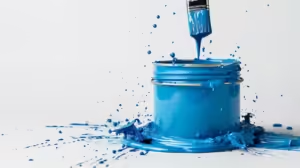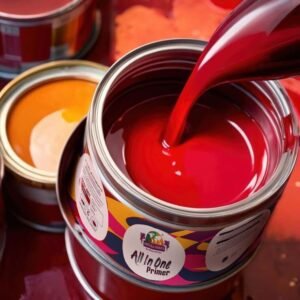Introduction to Water-Based Industrial Coatings
Industrial coatings are specialized paint formulations designed to protect and enhance various surfaces in industrial settings. These coatings are critical for preserving the integrity of machinery, equipment, and structures, ensuring longevity and maintaining aesthetic appeal. The primary purpose of industrial coatings is to provide a barrier against environmental factors, including moisture, UV radiation, and chemical exposure, which can lead to corrosion and degradation. Additionally, they can enhance safety by providing slip-resistant surfaces and facilitating visibility in work environments.
Traditional industrial coatings have primarily relied on solvent-based formulations, which have proven effective but carry significant environmental and health concerns. The release of volatile organic compounds (VOCs) during the application and drying processes poses risks to both workers and the environment. As regulations increasingly prioritize sustainability and safety, the industrial sector is turning towards more environmentally-friendly alternatives, such as water-based industrial coatings.
Water-based coatings offer several advantages over their solvent-based counterparts. They produce fewer harmful emissions, are often easier to clean up, and exhibit lower levels of toxicity – making them more suitable for indoor applications where ventilation may be limited. Furthermore, advancements in technology have led to improvements in the performance characteristics of these coatings, including durability, adhesion, and resistance to fading. With the rise of water-based industrial coatings, industries are not only meeting regulatory demands but also contributing positively to environmental preservation initiatives.
In the context of Mithila Paints, the transition towards water-based solutions marks a significant shift in how industrial surfaces are treated, moving towards a more sustainable future while still delivering high-quality performance. This evolution highlights the importance of selecting the right type of coating to meet specific industrial needs, balancing effectiveness with ecological responsibility.
What Are Water-Based Industrial Coatings?
Water-based industrial coatings are specialized formulations designed to protect and enhance various surfaces within industrial environments. Unlike traditional solvent-based coatings, which use organic solvents as their primary vehicle, water-based options utilize water as the primary solvent. This fundamental difference plays a crucial role in defining the characteristics and advantages of these coatings.
These coatings are typically formulated using a variety of resins, pigments, and additives that become dispersed in a water solution. The drying process occurs when the water evaporates, leaving behind a solid film that adheres to the substrate. This method of formulation not only provides effective coverage but also contributes to a finish that is often more flexible and durable compared to its solvent-based counterparts.
One of the significant environmental benefits of water-based industrial coatings is their low volatile organic compound (VOC) content. VOCs are known to contribute to air pollution and can pose health risks to workers in industrial settings. By choosing water-based solutions, industries can significantly reduce their environmental impact while also improving indoor air quality. This makes them a preferred choice for many sectors, including manufacturing, construction, and automotive industries.
Furthermore, water-based industrial coatings are becoming increasingly popular due to their ease of application and quicker drying times. These factors can enhance operational efficiency and decrease downtime during application processes. In a landscape where environmental regulations are tightening, and the demand for sustainable practices is rising, the shift towards water-based coatings is not just advantageous but essential for future compliance and corporate responsibility.
Overall, water-based industrial coatings provide a viable solution for numerous industrial applications, marrying durability with environmental responsibility while meeting both performance and aesthetic standards.

The Benefits of Choosing Water-Based Coatings
In recent years, the industrial sector has witnessed a significant shift towards water-based coatings, replacing traditional solvent-based options. The advantages of water-based industrial coatings are manifold, establishing them as a preferred choice among manufacturers, particularly in the context of Mithila Paints. One of the most crucial benefits is the reduction of volatile organic compounds (VOCs) emitted during application and drying. Water-based coatings typically contain lower levels of VOCs, which are not only harmful to the environment but also pose health risks to workers exposed to these fumes. By significantly lowering VOC emissions, companies can contribute to a healthier workplace and comply with stricter environmental regulations.
Another notable advantage is the ease of cleanup associated with water-based coatings. Unlike solvent-based products that require hazardous materials for effective cleaning, water-based options can be easily cleaned with water. This convenience not only saves time during the application process but also reduces the need for chemical cleaners that may further contribute to environmental degradation.
Moreover, the health risks associated with water-based coatings are markedly lower compared to their solvent-based counterparts. Workers are often exposed to fewer toxic ingredients when using water-based formulations, thereby decreasing the likelihood of respiratory issues and skin irritations. This aspect is particularly significant in manufacturing environments where worker safety is prioritized.
Furthermore, sustainability is a key component driving the adoption of water-based coatings. Given the growing emphasis on environmentally friendly practices, water-based solutions align with the eco-conscious ethos of modern industrial operations. They demonstrate a commitment to sustainability, thereby enhancing the reputation of brands like Mithila Paints in a competitive market.
In summary, the transition to water-based industrial coatings offers numerous benefits, including lower VOC emissions, easier cleanup, reduced health risks for workers, and improved sustainability. These advantages make them a compelling choice for industrial applications, fostering safer and more environmentally responsible practices.

Applications of Water-Based Industrial Coatings in Mithila
Water-based industrial coatings have emerged as a sustainable and effective solution for various industries in Mithila, facilitating a shift toward eco-friendly practices without compromising on performance. One prominent application of these coatings can be found in the automotive sector, where they are employed to provide a durable finish that meets strict regulatory standards. For instance, an automotive supplier in Mithila has successfully utilized water-based coatings for their vehicle components, ensuring compliance with environmental regulations while also delivering exceptional adhesion and resistance to corrosion.
In the construction industry, water-based coatings serve a critical role in both aesthetic and functional applications. They are commonly applied to walls, ceilings, and various structural elements, offering a quick-drying solution that minimizes downtime. A notable case study involves a local contractor who chose water-based coatings for a commercial building project. The contractor reported that not only were these coatings environmentally friendly, but they also significantly improved the project’s air quality during the application process due to reduced volatile organic compounds (VOCs).
Moreover, water-based coatings have found broad applications in the furniture manufacturing sector. These coatings provide an attractive finish, enhancing the visual appeal of furniture while ensuring durability and easy maintenance. A manufacturer in Mithila implemented a new line of water-based finishes that not only met customer demand for environmentally responsible products but also increased production efficiency. Customers praised the final products for their vibrant colors and robustness, solidifying water-based coatings as a suitable option in furniture design.
Overall, the versatility of water-based industrial coatings is evident in their diverse applications across key industries in Mithila. With ongoing advancements in formulation technology, the use of these coatings is expected to expand, further reinforcing their role in sustainable industrial practices.
Mithila Paints: Quality and Innovation
Mithila Paints has established itself as a leader in the coatings industry, prioritizing quality and innovation as core components of its mission. The company consistently invests in research and development, ensuring that its product line meets the evolving needs of industrial applications. Their commitment to excellence is evident in their extensive range of water-based industrial coatings, which are designed to provide superior durability and performance while being environmentally friendly.
The research initiatives at Mithila Paints focus on exploring advanced formulation technologies that improve the functionality of water-based coatings. This includes optimizing adhesion properties, enhancing weather resistance, and ensuring quicker drying times. These innovations enable their products to cater not only to traditional industries but also to the growing demand for sustainable solutions. Mithila Paints recognizes the critical role that these features play in various industrial settings, from manufacturing to construction.
Among the notable products in their water-based range are eco-friendly primers, high-performance topcoats, and specialized finishes that effectively meet the requirements of different substrates. This diversity allows clients to select specific coatings tailored to their operational needs, thereby promoting efficiency and longevity in their applications. Furthermore, by choosing water-based solutions, customers can benefit from lower volatile organic compound (VOC) emissions, aligning with contemporary environmental regulations and contributing to a healthier workplace.
In summary, Mithila Paints stands as a beacon of quality and innovation in the industrial coatings sector. The company’s relentless pursuit of research and development enables it to produce high-performance water-based products that meet the rigorous demands of modern industry while safeguarding environmental wellbeing. This commitment to quality ensures that customers receive not only superior products but also exceptional value and sustainability advantages.
Environmental Impact and Sustainability
The usage of water-based industrial coatings represents a significant advancement in the quest for sustainability within the coating industry. One of the primary environmental impacts of these coatings is the substantial reduction in harmful emissions. Traditional solvent-based coatings often release volatile organic compounds (VOCs), which contribute to air pollution and pose health risks. In contrast, water-based coatings are formulated with water as the main solvent, resulting in minimal VOC emissions. This transition aligns perfectly with global efforts to improve air quality and safeguard public health.
Mithila Paints is at the forefront of this transformation, actively contributing to a green economy by promoting water-based solutions in industrial applications. By prioritizing these eco-friendly coatings, Mithila Paints not only addresses the immediate environmental consequences of coating application but also supports the broader goal of achieving manufacturing sustainability. This commitment enables industries to lower their carbon footprints while adhering to increasingly stringent environmental regulations.
Additionally, the recyclability of water-based coatings adds another layer of environmental benefit. Unlike many solvent-based products, which can be challenging to dispose of and recycle, water-based coatings are often compatible with various recycling processes. This enhanced recyclability not only simplifies waste management but also encourages a circular economy model by facilitating the reintegration of materials into production workflows.
Moreover, the adoption of water-based industrial coatings contributes to the overall reduction of environmental footprints associated with industrial activities. By limiting emissions, improving worker safety, and allowing for easier waste management, Mithila Paints exemplifies how modern coatings can be both performance-driven and environmentally responsible. This dual focus not only meets the demands of today’s market but also establishes a sustainable pathway for future industrial practices.
Challenges and Limitations of Water-Based Coatings
Water-based industrial coatings have gained popularity for their environmental advantages and user-friendly application. However, they are not without their challenges and limitations. One significant issue is the drying time. Water-based coatings typically dry slower than their solvent-based counterparts, which can lead to extended project timelines. In environments where productivity is crucial, this slower drying process may result in operational delays, especially in applications requiring quick turnaround times.
Another concern is adhesion. While advances have been made in the formulation of water-based coatings, there are still instances where they may struggle to adhere effectively to some substrates. Poor surface preparation can exacerbate adhesion issues, leading to uneven finishes or premature peeling, particularly in high-moisture environments. As such, meticulous surface preparation is vital to ensure optimal performance.
Performance in extreme conditions presents another limitation. Water-based coatings may be less resistant to abrasion, chemicals, and high temperatures compared to solvent-based alternatives. In industrial settings subject to severe conditions, including high humidity and fluctuating temperatures, the durability and longevity of water-based coatings can be called into question. This makes it essential for manufacturers and applicators to assess the specific environmental challenges their coatings will face.
In terms of versatility, while water-based coatings are increasingly adaptable, they may still lack the range of finishes available with solvent-based options. For projects requiring specific aesthetic qualities or functional performance, this can limit the choices available to industrial painters. Additionally, the standardization across different manufacturers might cause variability in performance, posing further challenges for users.
Future Trends in Water-Based Coatings
The industrial coatings market is undergoing a significant transformation, primarily driven by advances in technology, stringent regulations, and shifting consumer preferences. Water-based industrial coatings are at the forefront of this evolution, as they offer numerous benefits over traditional solvent-based formulations, including lower volatile organic compound (VOC) emissions, enhanced safety, and improved user experience. As these trends continue to develop, several key factors are likely to shape the future landscape of water-based coatings.
Innovations in water-based formulations are anticipated to be a major trend in the coming years. Manufacturers are investing in research and development to create high-performance coatings that meet the rigorous demands of various industrial applications. These innovations may include the use of advanced resins, improved adhesion properties, and enhanced durability, ensuring that water-based options can compete effectively with their solvent-based counterparts. Furthermore, the development of more environmentally friendly additives is expected to gain traction, aligning with the ongoing commitment to sustainable practices within the industry.
Changes in regulations are also set to impact the water-based coatings market significantly. Governments worldwide are increasingly adopting stricter environmental policies aimed at reducing air pollution and promoting sustainability. As these regulations tighten, manufacturers will be pressured to develop and deliver compliant products. This shift towards regulatory compliance will drive an increased demand for water-based coatings, which are inherently less harmful to the environment compared to conventional formulations.
Finally, evolving consumer preferences are playing a crucial role in the adoption of water-based industrial coatings. A growing awareness of environmental issues and the desire for greener products are prompting consumers to seek alternatives that align with their values. This trend will push manufacturers to not only enhance the performance of their water-based offerings but also to effectively communicate the benefits to end-users. The continuous evolution of consumer expectations will undoubtedly shape the future trajectory of water-based industrial coatings in Mithila Paints and beyond.

Conclusion
As the landscape of industrial coatings evolves, the shift towards water-based options emerges as a pivotal transition for the sector. Water-based industrial coatings, such as those provided by Mithila Paints, exhibit numerous advantages over traditional solvent-based alternatives. These coatings not only minimize environmental impact but also enhance worker safety by reducing exposure to harmful volatiles. The sustainability aspect of these coatings aligns with both regulatory standards and corporate social responsibility goals, indicating a broader shift in industry values.
Investing in water-based coatings represents a commitment to modernizing practices that meet the demands of today’s eco-conscious market. The reduction of hazardous emissions and the promotion of a safer working environment contribute to a progressive approach that many businesses are beginning to adopt. As industries increasingly prioritize sustainability, the popularity of water-based coatings is set to rise, illustrating a collective move towards greener technologies.
Furthermore, the superior performance characteristics of water-based coatings—such as fast drying times, excellent adhesion, and ease of cleaning—prove beneficial to operational efficiencies. These features not only boost productivity but also ensure a longer lifespan for surfaces, ultimately providing a cost-effective solution in the long run. It is imperative for stakeholders in the industrial coatings market to stay informed of these advances and consider the specific benefits that water-based options offer, ensuring they remain competitive and environmentally responsible.
In summary, embracing change in industrial coatings is not merely a trend; it is an essential step towards sustainable development in manufacturing practices. As we look forward to a future that values environmental stewardship, adapting to the innovations in water-based industrial coatings will undoubtedly play a significant role in shaping a more sustainable industry.


